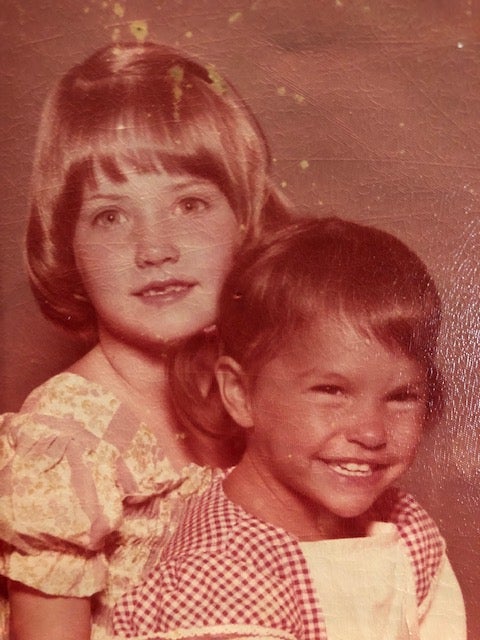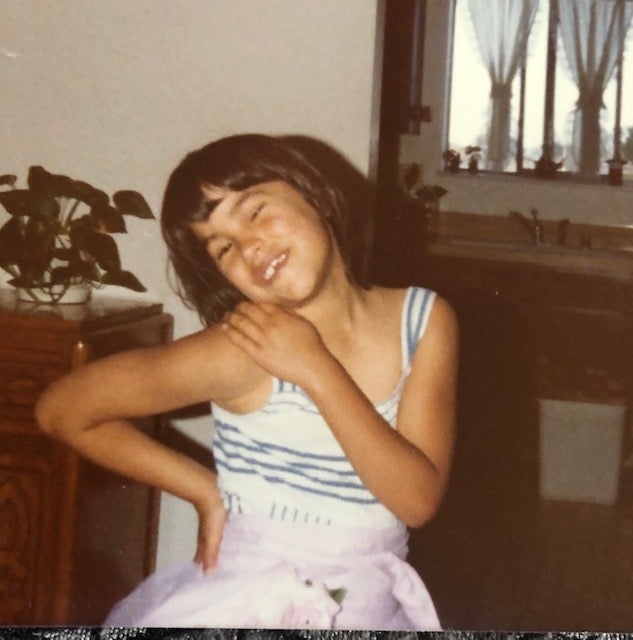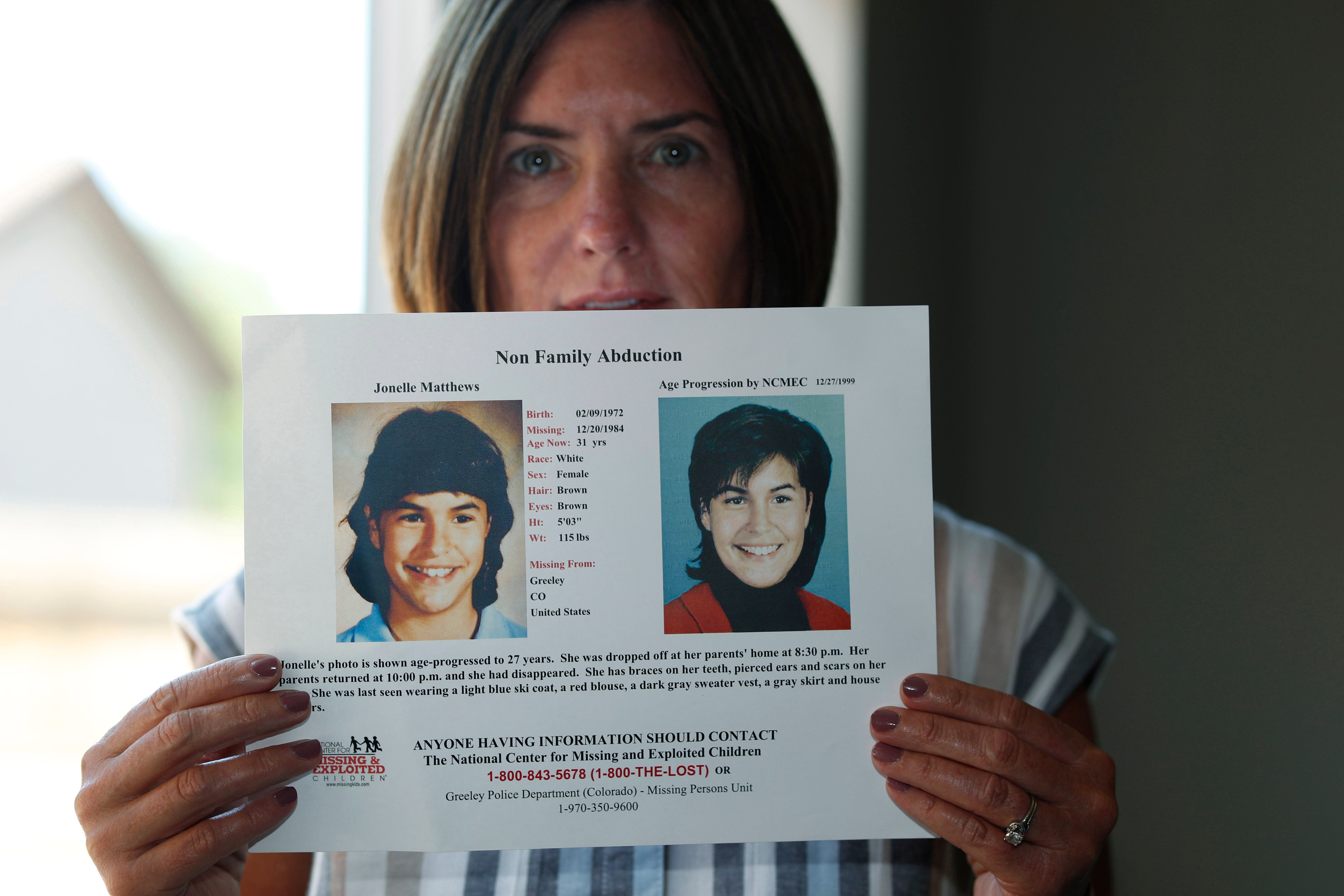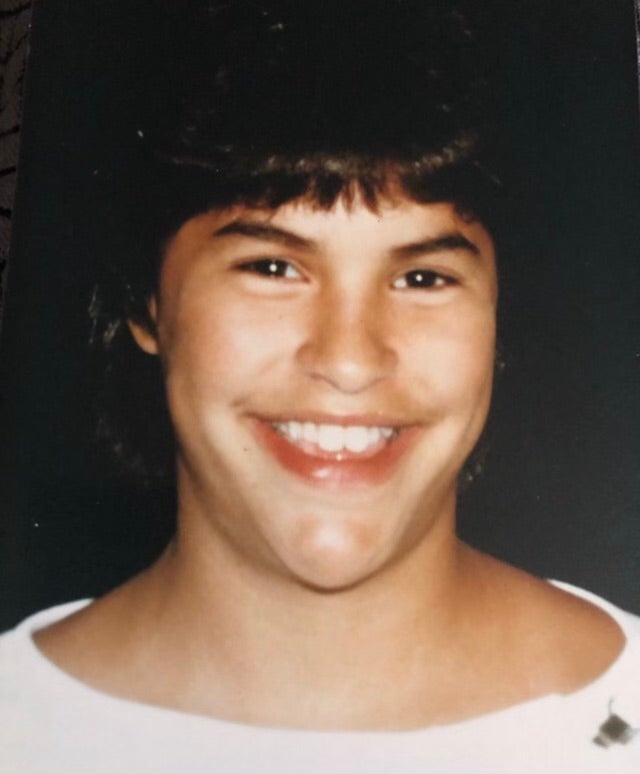My 12-year-old sister Jonelle Matthews was murdered in 1984. Nearly 40 years later, we finally have justice
Jonelle Matthews, 12, vanished from her Colorado home just before Christmas in 1984. Now that her killer has finally been convicted nearly 40 years later, Jonelle’s sister tells Sheila Flynn about achieving ‘earthly justice’ after decades of knowing nothing

On the Thursday before Christmas in 1984, 12-year-old Jonelle Matthews sang at a Christmas concert in her small city of Greeley, Colorado, then asked to watch her older sister, Jennifer, play in a basketball game. Jonelle had been sick for the past two days, however, so her parents told the stubborn sparkplug of a girl that she needed to return home and rest instead.
So her father went to the game with her sister; her mother headed to the airport to board a flight to California for a Christmas visit to family; and Jonelle was dropped home by her best friend and her dad.
It was the last time anyone would see the 12-year-old alive. For years, Jonelle would be remembered as a face on a milk carton, one of the first missing children featured in the famous national campaign.
The effort yielded nothing; the Matthews family eventually left Greeley. They held a funeral service for Jonelle 10 years after her disappearance.
Then, in 2019 – when Jonelle’s parents were living abroad – oil field workers digging a pipeline less than 20 miles from Greeley discovered human remains. They belonged to the Matthews’ 12-year-old daughter.

The shock news sent them rushing back to Greeley but proved to be just the beginning of a whirlwind after 35 years of simply ... waiting. It was determined Jonelle had been murdered by a gunshot to the head, a murder investigation followed, then the identification and arrest of a suspect, two trials and – finally, last week – a conviction.
Even more incredibly, after decades of hoping and countless hours of dogged investigations, it was the man’s own bizarre self-incriminating behaviour that landed him in cuffs.
Steven Pankey, 71 – a total stranger to the Matthews family who’d also lived in Greeley and nursed a grudge against their church – was sentenced to life in prison on Halloween.
“This closure, this verdict, and just going home knowing that when we leave Greeley, a big part of our life, our big part of our story, has a conclusion ... that just feels really good,” Jonelle’s sister, Jennifer Mogensen, tells The Independent.
She and her parents now live in Washington state and came back to Greeley for the trial – twice. Pankey was charged last year with kidnapping and murder but a mistrial was declared after the jury could not agree. The second trial began on 7 October.
Prosecutors outlined how Pankey had been excommunicated from the same church attended by the Matthews family, Sunny View Church of the Nazarene. He’d had an altercation with another congregant which resulted in criminal charges, leading to Pankey being kicked out of the church in 1977 and losing his job there as a janitor.

In trial testimony, Pankey’s ex-wife, Angela Hicks, said that he and church Pastor James Christy were “bitter enemies,” explaining that her former husband had a “grudge” as well against parishioner Russel Ross, also his former boss, the father of Jonelle’s best friend who’d dropped the murdered girl home on the night she vanished.
Ms Hicks testified she’d been physically abused by Pankey, an authoritarian who believed a woman’s place was in the home and harboured strange and toxic attitudes towards law enforcement. During the trial, his defense attorney admitted to her client’s conspiracy and anti-government beliefs but said he was not violent. (In the decades following Jonelle’s disappearance, Pankey twice ran a long-shot Republican campaign for governor of Idaho, where he’d moved.)
Pankey’s ex-wife, in testimony, described his unusual behaviour following Jonelle’s disappearance.
She said “Pankey acted suspiciously in the days following Jonelle’s disappearance, including making their family leave town, fixating on the news coverage and digging a hole for hours outside their house,” the Greeley Tribune reported. “One of his cars was also engulfed in flames on their property around that time.”
Twenty years before Jonelle’s body was discovered, Ms Hicks was already in contact with police about her husband’s seemingly odd connection to the case.
“In 1999, Hicks was collecting evidence, newspapers and legal files, and made a cassette statement on her accounts,” the Greeley Tribune reported. Pankey’s ex-wife said he knew about raked-over snow found outside the Matthews home on the night of her disappearance; raked-over shoe prints had indeed been found in the snow, and that information had been kept from the public.

Pankey himself, meanwhile, continued to act bizarrely. According to the indictment, he would insert himself into the investigation or make statements hinting at having knowledge of the case that “grew inconsistent and incriminating over time.”
When his son was killed in 2008, Pankey’s ex-wife testified that he knelt beside the urn and said “I hope God didn’t allow this to happen because of Jonelle Matthews.”
Pankey’s half-sister also testified at the trial and had also repeatedly contacted law enforcement about him in the years before his arrest.
At one point, Pankey even bragged to a cop that he had “bodies” buried somewhere in Colorado.
Throughout this time, the Matthews family had no idea that Pankey even existed. The first time her older sister, Jennifer Mogensen, heard his name was when a reporter called her in 2019 following the identification of Jonelle’s remains - saying: “Tell me your thoughts about Steve Pankey.”
‘And I said, ‘I can’t tell you my thoughts about him, because I have no idea what you’re talking about,’” Ms Mogensen, now 54, tells The Independent.
She called the Greeley detective, and that’s when the Matthews family first knew about the suspect.

Before that, “we had zero clue” who Pankey was, says Ms Mogensen, speaking from Greeley in the days after his conviction and life sentence. The family stayed with friends while back in the area.
Ten years after Jonelle’s disappearance, they’d held a funeral service for her in Greeley; in 2019, following the discovery of her body, a memorial service was held in the same church.
“This affected a lot more people than just the three of us,” Ms Mogensen tells The Independent. “And so it was a way for the community come and have a little bit of a closure.”
It was hard to have closure, she said, without any answers - and the developments which led to those came as a bit of a shock.
“We were not expecting it,” Ms Mogensen says of the 2019 remains discovery. “We closed the chapter of a missing person but then had to process a new set of feelings, knowing that she was murdered. And the fact that we had not just one but two trials within a three-year period” compounded the emotional toll.
Still - even with the revelations about Jonelle’s cause of death - there was “some comfort in knowing and having answers,” Ms Mogensen says. “It’s the not having answers where your mind can just go to places that could drive you crazy ... having closure like this is priceless.”

She says that her mother, Gloria, talked about for “years afterwards looking at young girls in the crowd just to see if it’s Jonelle”.
“I didn’t do that, as a sibling,” she says. “So I think people process the not knowing differently.”
She knows that her own processing is far from over.
“It’s not only processing just these last 30 days, but these last three years and, if you really think about it, these last 38 years,” she tells The Independent.
For his part, Pankey will be in prison for at least the next two decades; he’ll be eligible for parole in 20 years - when he’ll be 91. He maintained his innocence, telling the court: “This is not justice for Jonelle.”
Ms Mogensen was having none of it.
“He’s an evil person,” she tells The Independent. “I think he can’t let go of things and holds grudges and doesn’t like people in authority over him ... I don’t have a complete understanding of what he did that night, but if if you are so driven by anger towards another sector, like a church or people in the church, that you are willing to commit a crime ... that that says something about you.”
She says she believes that Pankey “will have to answer to God, as well”.
“I am grateful for earthly justice,” she says. “But if [conviction and sentencing] did not happen for our family, I could rest and be at peace knowing that he would have to answer some day.”
“I’m not fixated by him,” she adds. “I am not going to harbour just anger towards him, because I will not give him another victim. And I think, when you are saturated with anger towards somebody, you’re giving that person another victim. And I won’t do that.”



